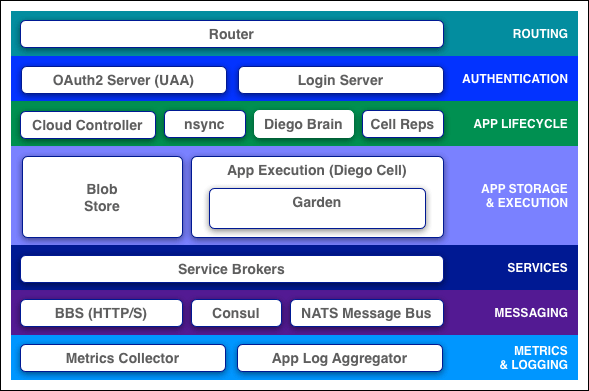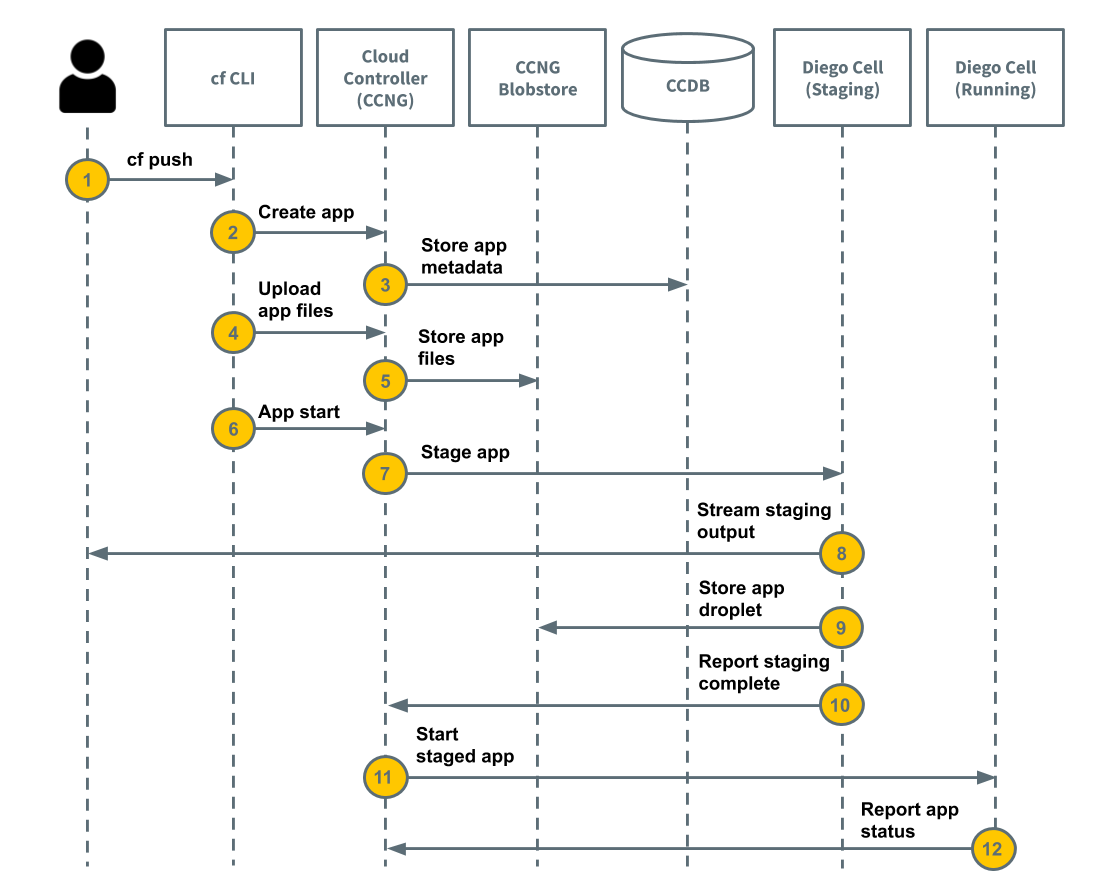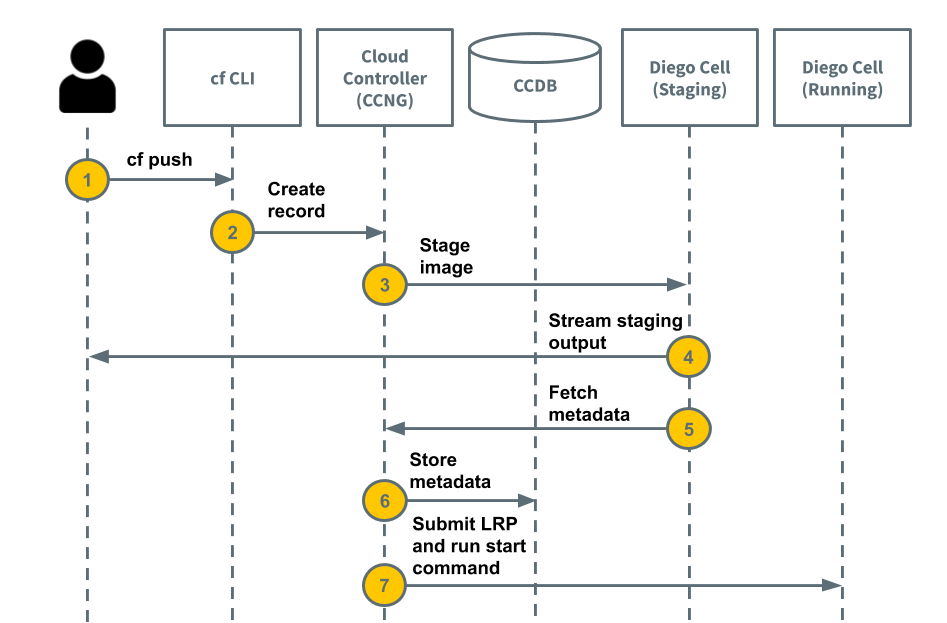Pivotal/Cloud Foundry
Cloud Foundry | Cloud Foundry CLI | Apps | Tasks | Logs | OpsManager
Contents |
Overview
Software Platform that lets you build and run software in a consistent way, in any place.
Runs across any platform such as:
- Amazon Web Services
- Microsoft Azure
- Google Cloud Platform
- Open Stack
- VMWare
Cloud Foundry builds out the infrastructure including the virtual machine and a hardened version of the operating system, Windows or Linux.
The Operations Manager Login URL will be like: https://{opsman_domain}/uaa/login
ie. https://opsmgr-10.haas-59.pez.pivotal.io/uaa/login
The Pivotal Apps Manager Login URL will be like: https://login.{system_domain}/login. You can use the following credentials from the PAS tile to log in: UAA > Admin
ie. https://login.run-10.haas-59.pez.pivotal.io/login
Hierarchy

Fundamental Concepts
Process Changes
- Distributed System
- Distributed systems are hard to build, test, manage, and scale.
- Ephemeral Infrastructure
- Virtual machines and containers are temporary
- Immutable Infrastructure
- Updates to systems and applications are not done in-place but rather new, updated instances are created instead.
Elastic Runtime (CF)
Diego
Schedules tasks and long-running processes (LRPs)
- Task - guaranteed to run at most once
eg. stage and application - LRP - a long running process, typically represented as a web app. lrps can have multiple instances.
- Container - An application instance is run within an immutable container
- Cell - Containers are run within a cell.
- Garden - Containers are managed by Garden.
- Rep - represents the cell in the BBS/auctions
- Auction - auctions are held to bid on executing a task or an LRP.
- Executor - Manages container allocations on the cell. Also streams
stdoutandstderrto Metron - Metron - Forwards logs to the loggregator subsystem
- BBS - Bulletin Board System is the API to access the Diego database for tasks and LRPs.
- Brain - The brain is composed of two components, the auctioneer which holds auctions for tasks and LRPs, and the Converger which reconciles desired LRPs vs Actual LRPs through auctions.
Loggregator
- Metron - Forwards logs to the loggregator subsystem
- Doppler - Gathers logs from Metron. also has app syslog drains to services like splunk or papertrail.
- Traffic Controller - Handles client requests for logs. Also exposes a web socket endpoint called the firehose.
- Firehose - A websocket endpoint that exposes app logs, container metrics, and ER component metrics.
- Nozzles - Consume the firehose output
Cloud Controller API
The Cloud Controller exposes an API for using and managing the Elastic Runtime (CF)
- Cloud Controller Database - The cloud controller persists org/space/app data in the cloud controller database
- Blob Store - The cloud controller persists app packages and droplets to the blob store.
- CC-Bridge - The CC-Bridge translates app specific messages into the generic language of tasks and LRPs.
Routing
The router routes traffic to appropriate components and all app instances.
The router round robins between application instances
Buildpacks
Buildpacks provide framework and runtime support for your applications. They build immutable droplets (stage your application).
How Diego stages buildpack applications

How Diego stages docker images

High Availability
Availability Zones
Application instances are evenly distributed across availability zones. An Application will stay up despite losing an AZ.
Bosh Managed Processes
Elastic runtime processes are monitored and automatically restarted. This is monitored by Monit. The event will be reported to the health monitor for further investigation.
Resurrector
The Bosh agent continuously reports health of the VM/job. if the VM fails or is destroyed/deleted, it will be automatically recreated when the health monitor resurrector reports it to the BOSH director.
Self Healing Application Instances
Once running, failed application instances will be recreated. The brain monitors application instances to verify that the desired state = actual state. When they do not match, the brain will begin the process of recreating the application instance.
Startup Order
As of PAS 2.2, this is the startup order i've found for CF applications using bosh manifest
consul_server > nats > nfs_server > mysql_proxy > mysql > diego_database > uaa > cloud_controller > ha_proxy > router > mysql_monitor > clock_global > cloud_controller_worker > diego_brain > diego_cell > loggregator_trafficcontroller > syslog_adapter > syslog_scheduler > doppler > credhub
- name: database
- instances: 0
- serial: true
- name: blobstore
- instances: 0
- serial: true
- name: control
- instances: 0
- serial: true
- name: compute
- instances: 0
- name: consul_server
- instances: 1
- serial: true
- name: nats
- instances: 1
- name: nfs_server
- instances: 1
- serial: true
- name: mysql_proxy
- instances: 1
- name: mysql
- instances: 1
- name: backup-prepare
- instances: 0
- name: diego_database
- instances: 1
- serial: true
- name: uaa
- instances: 1
- serial: true
- name: cloud_controller
- instances: 1
- serial: true
- name: ha_proxy
- instances: 1
- name: router
- instances: 1
- serial: true
- name: mysql_monitor
- instances: 1
- name: clock_global
- instances: 1
- name: cloud_controller_worker
- instances: 1
- name: diego_brain
- instances: 1
- name: diego_cell
- instances: 1
- name: loggregator_trafficcontroller
- instances: 1
- name: syslog_adapter
- instances: 1
- name: syslog_scheduler
- instances: 1
- name: doppler
- instances: 1
- name: tcp_router
- instances: 0
- name: credhub
- instances: 1
- name: push-apps-manager
- instances: 0